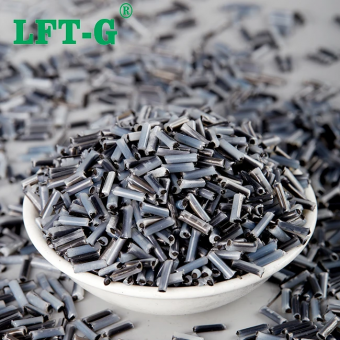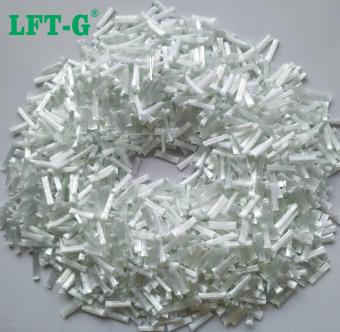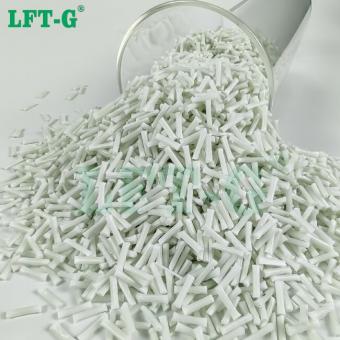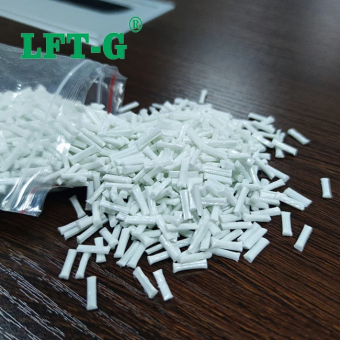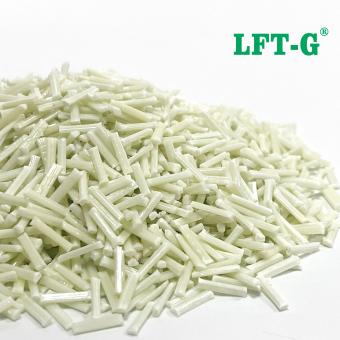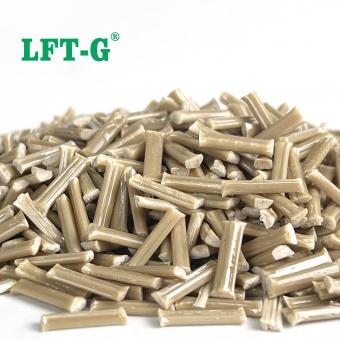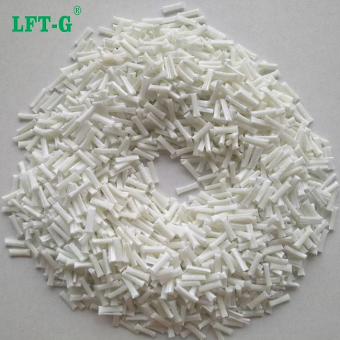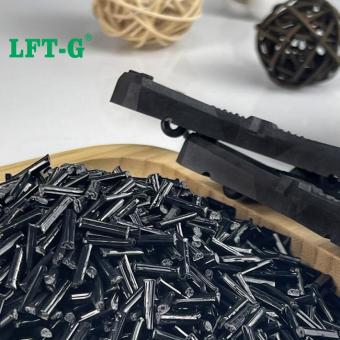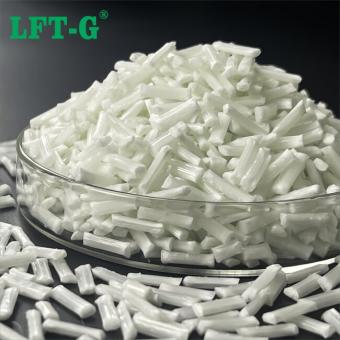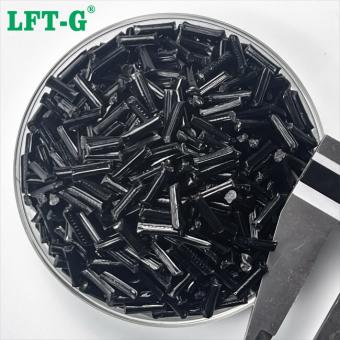-
Homopolymer Long carbon fiber Reinforced Polypropylene PPHomopolymer Long carbon fiber Reinforced Polypropylene PP can produce a wide range of products using a variety of processing techniques. Typical application range automotive industry accessories.
- Reinforced Polypropylene
- PP polymer
- Composited Polypropylene with Long carbon fiber
- long carbon fiber with Polypropylene
Tags :
-
PP excellent resistance to creep pp resin polypropylene lgf polymerexcellent resistance to creep pp resin polypropylene polymer which is producted in our factory.
- pp resin polypropylene
- recycled pp pellets
- pp pellets raw materials
- high strength and high toughness reinforced pp pellets
- pp polymer
- pp long glass fiber
Tags :
-
LFT-G Homo Polypropylene filling Long carbon fiber 20%-60% injection molding high toughness and strength 12mmPP-LCF reinforced plastic With the development of new energy vehicles and in the trend of automotive lightweighting, carbon fiber reinforced materials are more and more widely used in the automotive field, especially carbon fiber reinforced PP materials. The modified PP reinforced by carbon fiber has a series of advantages such as light weight, high modulus, high specific strength, low coefficient of thermal expansion, high temperature resistance, heat and impact resistance, corrosion resistance, good vibration absorption, etc., which can be applied to automotive parts such as sub-instrument assembly. While composites may be more expensive to manufacture than standard metals or non-reinforced plastics, their extended life, higher fuel efficiency and lower manufacturing costs can offset the initial cost over the life of the product, making carbon fiber a viable alternative. Advanced composites outperform metals: Compared to traditional materials such as aluminum and metals, carbon fiber composites offer a high-performance solution for producing lighter weight, stronger structural components. Application for reference Projects our customers used to test The difference between LCF and SCF Short fiber-reinforced thermoplastic materials: fiber retention length <1M. Long fiber-reinforced thermoplastic materials: fiber retention length 6~25MM. The longer the length of carbon fiber retained, the better the mechanical properties. Uneven distribution of fibers in the cross section of short fiber particles. The arrangement of the particle cross-section of long fibers is orderly, so the overall structure is strong, so the hardness is definitely better than that of short fiber discs. Other materials you may wonder PA6-LCF PA66-LCF PEEK-LCF About us Xiamen LFT composite plastic Co., Ltd. is a brand-name company that focuses on LFT&LFRT. Long Glass Fiber Series (LGF) & Long Carbon Fiber Series (LCF). The company's thermoplastic LFT can be used for LFT-G injection molding and extrusion, and can also be used for LFT-D molding. It can be produced according to customer requirements: 5~25mm length. The company's long-fiber continuous infiltration reinforced thermoplastics have passed ISO9001&16949 system certification, and the products have obtained lots of national trademarks and patents. Contact us if you need LFT-G® PP LCF material
- PP virgin grade cfrp
- reinforced pp long carbon fiber
- pp compounds cf
- thermoplastic pp lft-g
- black pp polymer pellets
- pp high toughness carbon fiber
Tags :
-
Xiamen LFT Polypropylene add long carbon fiber modified plastic higher strength and rigidityCarbon Fiber Reinforced Plastic Carbon fiber reinforced plastic composite (CFRP) is a lightweight, strong material that can be used to make a wide range of products used in everyday life. It is a term used to describe fiber reinforced composites with carbon fiber as the main structural component. Note that the "P" in CFRP can also stand for "plastic" rather than "polymer." Typically, CFRP composites use thermosetting resins such as epoxy, polyester, or vinyl esters. Despite the use of thermoplastic resins in CFRP composites, "carbon fiber reinforced thermoplastic composites" often uses its own acronym, CFRTP composites. LFT-G focuses on LFT&LFRT. Long Glass Fiber Series (LGF) & Long Carbon Fiber Series. Compared with Short Carbon Fiber, Long Carbon Fiber has more excellent performance in mechanical properties. It is more suitable for large products and structural parts. It has 1-3 times higher (toughness) than Short Carbon Fiber, and the tensile strength(strength and rigidity) is increased by 0.5-1 times. Properties of CFRP composites Composites reinforced with carbon fiber are different from other FRP composites that use traditional materials such as glass fiber or arylon fiber. Advantages of CFRP composites include: Light weight: Conventional fiberglass reinforced composites using continuous fiberglass and 70% fiberglass (glass weight/gross weight) typically have a density of 0.065 lb/cubic inch. A CFRP composite with the same 70% fiber weight might typically have a density of 0.055 lb/cubic inch. Increased strength: Carbon fiber composites not only weigh less, but CFRP composites are stronger and stiffer per unit weight. This is true when comparing carbon fiber composites to glass fibers, and even more so when comparing metals. For example, when comparing steel to CFRP composites, a good rule of thumb is that a carbon fiber structure of the same strength typically weighs 1/5 as steel. You can imagine why car companies are looking into using carbon fiber instead of steel. When comparing CFRP composites to aluminum (one of the lightest metals used), the standard assumption is that an aluminum structure of the same strength might weigh 1.5 times as much as a carbon fiber structure. Of course, there are many variables that can change this comparison. Grades and qualities of materials may vary, and for composites, the manufacturing process, fiber structure and quality need to be considered. Disadvantages of CFRP composites Cost: As amazing as the material is, there's a reason carbon fiber can't be used in every situation. Currently, the cost of CFRP composites is too high in many cases. Depending on current market conditions (supply and demand), the type of carbon fiber (aerospace grade versus commercial grade), and bundle size, carbon fiber prices can vary significantly. On a per-pound basis, carbon fiber can cost anywhere from five to 25 times more than fiberglass. The difference is even greater when comparing steel with CFRP composites. Electrical conductivity: This can be a plus or minus for carbon fiber composites, depending on the application. Carbon fiber is extremely conductive, while glass fiber is insulating. Many applications use fiberglass instead of carbon fiber or metal, strictly because of electrical conductivity. For example, in the utility industry, many products require the use of fiberglass. This is one of the reasons why the ladder uses fiberglass as the ladder rail. The chance of electric shock is much lower if the fiberglass ladder comes into contact with the power cord. The situation with CFRP ladders is different. Although the cost of CFRP composites remains high, new technological advances in manufacturing are continuing to provide more cost effective products. Application of PP-LCF Long Carbon Fiber as the reinforcement material of CFRP, its proportion is only 1/4 of iron, specific strength is 10 times that of iron, elastic modulus is 7 times that of iron, carbon fiber excellent physical properties are played in various fields from sports goods to aircraft. Details of product Number Length Color Sample Package Delivery time Port of Loading Freight PP-NA-LCF30 5-25mm Original color (can be customized) Available 20kg a bag 7-15days after shipment Xiamen Port Depending on your destination Related products PA6-LCF PA66-LCF About Xiamen LFT Composite plastic Co., Ltd. A new material enterprise that develops and produces its own brand of LFT long glass fiber and long carbon fiber. It fills the blank of domestic high-end long carbon fiber LFT materials, and is more customized and shortened the production cycle compared with foreign companies. In addition, our company has sales and service offices in Zhejiang, Jiangsu, Guangzhou, Chongqing, etc. ...
- Long fiber reinforced thermoplastics
- Modified materials of long carbon fiber
- Homopolymer long carbon fiber PP
- The modified PP high performance
- Long carbon fiber filling plastic PP car part use
- LFT-G brand materials pp polymer chemical resistance
Tags :
-
Xiamen LFT Long glass fiber filled Polypropylene reinforced plastic pelletsGrade: General grade, Heat-resistant grade, UV-resistant grade, Toughen resistant grade Fiber specification: 20%-70% Product application: Industrial products, Household appliances, Automotive components and so on.
- general grade modified PP GF30
- Heat-resistant grade long cut PP polymers
- UV-resistant grade PP LFT for home appliances
- Toughen resistant grade PP with filler glass fiber
- Injection grade PP compounds instead metal
- Wide application range PP thermoplastic resin
Tags :
-
Xiamen LFT reinforcement Polypropylene long glass fiber modifiedLong glass fiber reinforcement thermoplastic polypropylene resin
- Long fiber reinforced thermoplastics composite PP
- metal replacement PP polymer glass fiber reinforced
- High fatigue and creep endurance
- China manufacturer Polypropylene good price
- long glass fiber modified PP for car parts gfrp PP GF30
- higher performance than short/chopped glass fiber filled compounds.
Tags :
-
Xiamen LFT Polyprolylene long carbon fiber reinforced granules for automotiverecycle and virgin long carbon fiber pp 94-V0 granules
- carbon fibre reinforced pp lcf pellet
- pp polypropylene homopolymer lcf
- long carbon fiber reinforced pp polymers
- long carbon fiber pp copolymer granules
- custom polypropylene pp lcf injection molding
- LFT PP polypropylene homopolymer
Tags :
-
Xiamen LFT Polypropylene filled Long Carbon Fiber modified plastic high strength and rigidityCarbon Fiber Reinforced Plastic Carbon fiber reinforced plastic composite (CFRP) is a lightweight, strong material that can be used to make a wide range of products used in everyday life. It is a term used to describe fiber reinforced composites with carbon fiber as the main structural component. Note that the "P" in CFRP can also stand for "plastic" rather than "polymer." Typically, CFRP composites use thermosetting resins such as epoxy, polyester, or vinyl esters. Despite the use of thermoplastic resins in CFRP composites, "carbon fiber reinforced thermoplastic composites" often uses its own acronym, CFRTP composites. LFT-G focuses on LFT&LFRT. Long Glass Fiber Series (LGF) & Long Carbon Fiber Series. Compared with Short Carbon Fiber, Long Carbon Fiber has more excellent performance in mechanical properties. It is more suitable for large products and structural parts. It has 1-3 times higher (toughness) than Short Carbon Fiber, and the tensile strength(strength and rigidity) is increased by 0.5-1 times. Properties of CFRP composites Composites reinforced with carbon fiber are different from other FRP composites that use traditional materials such as glass fiber or arylon fiber. Advantages of CFRP composites include: Light weight: Conventional fiberglass reinforced composites using continuous fiberglass and 70% fiberglass (glass weight/gross weight) typically have a density of 0.065 lb/cubic inch. A CFRP composite with the same 70% fiber weight might typically have a density of 0.055 lb/cubic inch. Increased strength: Carbon fiber composites not only weigh less, but CFRP composites are stronger and stiffer per unit weight. This is true when comparing carbon fiber composites to glass fibers, and even more so when comparing metals. For example, when comparing steel to CFRP composites, a good rule of thumb is that a carbon fiber structure of the same strength typically weighs 1/5 as steel. You can imagine why car companies are looking into using carbon fiber instead of steel. When comparing CFRP composites to aluminum (one of the lightest metals used), the standard assumption is that an aluminum structure of the same strength might weigh 1.5 times as much as a carbon fiber structure. Of course, there are many variables that can change this comparison. Grades and qualities of materials may vary, and for composites, the manufacturing process, fiber structure and quality need to be considered. Disadvantages of CFRP composites Cost: As amazing as the material is, there's a reason carbon fiber can't be used in every situation. Currently, the cost of CFRP composites is too high in many cases. Depending on current market conditions (supply and demand), the type of carbon fiber (aerospace grade versus commercial grade), and bundle size, carbon fiber prices can vary significantly. On a per-pound basis, carbon fiber can cost anywhere from five to 25 times more than fiberglass. The difference is even greater when comparing steel with CFRP composites. Electrical conductivity: This can be a plus or minus for carbon fiber composites, depending on the application. Carbon fiber is extremely conductive, while glass fiber is insulating. Many applications use fiberglass instead of carbon fiber or metal, strictly because of electrical conductivity. For example, in the utility industry, many products require the use of fiberglass. This is one of the reasons why the ladder uses fiberglass as the ladder rail. The chance of electric shock is much lower if the fiberglass ladder comes into contact with the power cord. The situation with CFRP ladders is different. Although the cost of CFRP composites remains high, new technological advances in manufacturing are continuing to provide more cost effective products. Application of PP-LCF Long Carbon Fiber as the reinforcement material of CFRP, its proportion is only 1/4 of iron, specific strength is 10 times that of iron, elastic modulus is 7 times that of iron, carbon fiber excellent physical properties are played in various fields from sports goods to aircraft. Details of product Number Length Color Sample Package Delivery time Port of Loading Freight PP-NA-LCF30 5-25mm Original color (can be customized) Available 20kg a bag 7-15days after shipment Xiamen Port Depending on your destination Related products PA6-LCF PA66-LCF About Xiamen LFT Composite plastic Co., Ltd. A new material enterprise that develops and produces its own brand of LFT long glass fiber and long carbon fiber. It fills the blank of domestic high-end long carbon fiber LFT materials, and is more customized and shortened the production cycle compared with foreign companies. In addition, our company has sales and service offices in Zhejiang, Jiangsu, Guangzhou, Chongqing, etc. ...view more
-
Xiamen LFT Polypropylene filled Long Carbon Fiber modified plastic high strength and rigidityCarbon Fiber Reinforced Plastic Carbon fiber reinforced plastic composite (CFRP) is a lightweight, strong material that can be used to make a wide range of products used in everyday life. It is a term used to describe fiber reinforced composites with carbon fiber as the main structural component. Note that the "P" in CFRP can also stand for "plastic" rather than "polymer." Typically, CFRP composites use thermosetting resins such as epoxy, polyester, or vinyl esters. Despite the use of thermoplastic resins in CFRP composites, "carbon fiber reinforced thermoplastic composites" often uses its own acronym, CFRTP composites. LFT-G focuses on LFT&LFRT. Long Glass Fiber Series (LGF) & Long Carbon Fiber Series. Compared with Short Carbon Fiber, Long Carbon Fiber has more excellent performance in mechanical properties. It is more suitable for large products and structural parts. It has 1-3 times higher (toughness) than Short Carbon Fiber, and the tensile strength(strength and rigidity) is increased by 0.5-1 times. Properties of CFRP composites Composites reinforced with carbon fiber are different from other FRP composites that use traditional materials such as glass fiber or arylon fiber. Advantages of CFRP composites include: Light weight: Conventional fiberglass reinforced composites using continuous fiberglass and 70% fiberglass (glass weight/gross weight) typically have a density of 0.065 lb/cubic inch. A CFRP composite with the same 70% fiber weight might typically have a density of 0.055 lb/cubic inch. Increased strength: Carbon fiber composites not only weigh less, but CFRP composites are stronger and stiffer per unit weight. This is true when comparing carbon fiber composites to glass fibers, and even more so when comparing metals. For example, when comparing steel to CFRP composites, a good rule of thumb is that a carbon fiber structure of the same strength typically weighs 1/5 as steel. You can imagine why car companies are looking into using carbon fiber instead of steel. When comparing CFRP composites to aluminum (one of the lightest metals used), the standard assumption is that an aluminum structure of the same strength might weigh 1.5 times as much as a carbon fiber structure. Of course, there are many variables that can change this comparison. Grades and qualities of materials may vary, and for composites, the manufacturing process, fiber structure and quality need to be considered. Disadvantages of CFRP composites Cost: As amazing as the material is, there's a reason carbon fiber can't be used in every situation. Currently, the cost of CFRP composites is too high in many cases. Depending on current market conditions (supply and demand), the type of carbon fiber (aerospace grade versus commercial grade), and bundle size, carbon fiber prices can vary significantly. On a per-pound basis, carbon fiber can cost anywhere from five to 25 times more than fiberglass. The difference is even greater when comparing steel with CFRP composites. Electrical conductivity: This can be a plus or minus for carbon fiber composites, depending on the application. Carbon fiber is extremely conductive, while glass fiber is insulating. Many applications use fiberglass instead of carbon fiber or metal, strictly because of electrical conductivity. For example, in the utility industry, many products require the use of fiberglass. This is one of the reasons why the ladder uses fiberglass as the ladder rail. The chance of electric shock is much lower if the fiberglass ladder comes into contact with the power cord. The situation with CFRP ladders is different. Although the cost of CFRP composites remains high, new technological advances in manufacturing are continuing to provide more cost effective products. Application of PP-LCF Long Carbon Fiber as the reinforcement material of CFRP, its proportion is only 1/4 of iron, specific strength is 10 times that of iron, elastic modulus is 7 times that of iron, carbon fiber excellent physical properties are played in various fields from sports goods to aircraft. Details of product Number Length Color Sample Package Delivery time Port of Loading Freight PP-NA-LCF30 5-25mm Original color (can be customized) Available 20kg a bag 7-15days after shipment Xiamen Port Depending on your destination Related products PA6-LCF PA66-LCF About Xiamen LFT Composite plastic Co., Ltd. A new material enterprise that develops and produces its own brand of LFT long glass fiber and long carbon fiber. It fills the blank of domestic high-end long carbon fiber LFT materials, and is more customized and shortened the production cycle compared with foreign companies. In addition, our company has sales and service offices in Zhejiang, Jiangsu, Guangzhou, Chongqing, etc. ...view more
-
Xiamen LFT Polypropylene filled Long Carbon Fiber modified plastic high strength and rigidityCarbon Fiber Reinforced Plastic Carbon fiber reinforced plastic composite (CFRP) is a lightweight, strong material that can be used to make a wide range of products used in everyday life. It is a term used to describe fiber reinforced composites with carbon fiber as the main structural component. Note that the "P" in CFRP can also stand for "plastic" rather than "polymer." Typically, CFRP composites use thermosetting resins such as epoxy, polyester, or vinyl esters. Despite the use of thermoplastic resins in CFRP composites, "carbon fiber reinforced thermoplastic composites" often uses its own acronym, CFRTP composites. LFT-G focuses on LFT&LFRT. Long Glass Fiber Series (LGF) & Long Carbon Fiber Series. Compared with Short Carbon Fiber, Long Carbon Fiber has more excellent performance in mechanical properties. It is more suitable for large products and structural parts. It has 1-3 times higher (toughness) than Short Carbon Fiber, and the tensile strength(strength and rigidity) is increased by 0.5-1 times. Properties of PP CF Composites Composites reinforced with carbon fiber are different from other FRP composites that use traditional materials such as glass fiber or arylon fiber. Advantages of CFRP composites include: Light weight: Conventional fiberglass reinforced composites using continuous fiberglass and 70% fiberglass (glass weight/gross weight) typically have a density of 0.065 lb/cubic inch. A CFRP composite with the same 70% fiber weight might typically have a density of 0.055 lb/cubic inch. Increased strength: Carbon fiber composites not only weigh less, but CFRP composites are stronger and stiffer per unit weight. This is true when comparing carbon fiber composites to glass fibers, and even more so when comparing metals. For example, when comparing steel to CFRP composites, a good rule of thumb is that a carbon fiber structure of the same strength typically weighs 1/5 as steel. You can imagine why car companies are looking into using carbon fiber instead of steel. When comparing CFRP composites to aluminum (one of the lightest metals used), the standard assumption is that an aluminum structure of the same strength might weigh 1.5 times as much as a carbon fiber structure. Of course, there are many variables that can change this comparison. Grades and qualities of materials may vary, and for composites, the manufacturing process, fiber structure and quality need to be considered. Application of PP-LCF Long Carbon Fiber as the reinforcement material of CFRP, its proportion is only 1/4 of iron, specific strength is 10 times that of iron, elastic modulus is 7 times that of iron, carbon fiber excellent physical properties are played in various fields from sports goods to aircraft. Details of product Number Length Color Sample Package Delivery time Port of Loading Freight PP-NA-LCF30 5-25mm Original color (can be customized) Available 20kg a bag 7-15days after shipment Xiamen Port Depending on your destination Related products PA6-LCF PA66-LCF About Xiamen LFT Composite plastic Co., Ltd. A new material enterprise that develops and produces its own brand of LFT long glass fiber and long carbon fiber. It fills the blank of domestic high-end long carbon fiber LFT materials, and is more customized and shortened the production cycle compared with foreign companies. In addition, our company has sales and service offices in Istanbul, Zhejiang, Jiangsu, Guangzhou, etc. It can more easily to understand customer needs and has more convenient after sale.view more
-
Copolymer Polypropylene With Filler Long Glass Fiber Reinforced for InjectionPP long glass fiber reinforced composites offer excellent mechanical properties, including high tensile strength, impact resistance, and dimensional stability, making them ideal for demanding applications. These materials are widely used in the automotive, home appliance, and industrial sectors, where durability and performance are critical. With glass fiber content ranging from 20% to 60%, they provide a balance between strength and weight reduction, enhancing the overall efficiency of the final product.
- PP polymer GF composites
- Polypropylene resin China manufacture
- Thermoplastic resin made in China
- pp glass fiber filament
- EDM wholesell on stock PP materials
- Best priice PP high strength
Tags :
-
Advanced Carbon Materials Polypropylene Resin Long Carbon Fiber Reinforced PelletsPolypropylene long carbon fiber reinforced material provides exceptional strength, stiffness, and lightweight properties, making it an ideal choice for high-performance engineering applications. With excellent impact resistance, chemical resistance, and cost-effectiveness, this material is widely used in automotive, industrial, and consumer goods sectors. Its durability and thermal stability ensure reliable performance even under challenging conditions.
- China manufacturer carbon fiber compounds
- Polypropylene raw materials
- PA12 black carbon
- PP carbon fiber
- carbon fiber nylon pp
Tags :

 e-mail
e-mail English
English français
français Deutsch
Deutsch русский
русский italiano
italiano español
español português
português العربية
العربية 日本語
日本語 한국의
한국의 中文
中文





